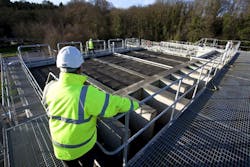Filtration Delivers Enhanced Effluent Quality & Satisfy Environmental Regulations
In July 2010, Northumbrian Water decided to invest £5 million to upgrading its assets and systems at the Consett Sewage Treatment Works in the northeast of England.
A swelling population within the plant’s catchment area due to extensive residential development meant that demand for the treatment of wastewater would inevitably increase beyond the existing volume of 10 million liters daily. As a result, the company needed efficient and robust technologies to ensure that there was no drop-off in the quality of effluent, whilst also meeting new and demanding consent levels with respect to suspended solids, phosphate ammonia and organics removal.
Prior to work starting at Consett, the average flow was 14,342 cu meters per day, with the new plant designed to achieve a final effluent consent of 15 mg/L biochemical oxygen demand (BOD), 20 mg/L total suspended solids and 5 mg/L ammonia.
The Solution
De Nora Water Technologies was contracted by specialist contractor Carillion to design, manufacture, deliver to site, offload, install, commission and optimise five De Nora Tetra NSAF cells and four De Nora Tetra DeepBed filtration cells. The new processes would operate in series on a small area of designated free land to ensure that the quality of effluent was maintained to the highest standards despite the increase in demand. At the same time, a reduction in phosphate levels would deliver further environmental and amenity improvements.
About the Technology
Tetra NSAF is an up-flow, fixed-film biological reactor that generates minimal solids requiring handling and disposal following treatment. The technology is robust and adaptable and can be engineered in a range of sizes, from small modular units suitable for above- or belowground construction to bespoke configurations for large plants.
Tetra DeepBed filters provide solids and related phosphorous removal to meet stringent limits below 0.2 parts per million. The system is a down-flow sand filter with a high loading capacity, making it suitable for handling peak loads.
Positive Impact
Installation of De Nora Tetra NSAF and Tetra DeepBed filters has delivered a reduction of 6% in the amount of suspended solids and almost a 15% reduction for phosphate, improving the quality of effluent discharged to an area of truly outstanding natural beauty.
This has had a significant positive impact on the overall health and amenity value of the river systems, as there are fewer solids to block out light and potentially increase silt in the river systems. In addition, reductions in the levels of phosphates in the water have tackled potentially harmful and toxic algal growths that deprive the river of its life source—oxygen.
The investment by Northumbrian Water has significantly reduced the variability in the quality of the effluent, so seasonality, weather or other aspects that had caused problems in the past do not impact the levels discharged to the environment.
The installation of NSAF and Tetra DeepBed filters at this strategic sewage treatment works also has provided additional capacity to support the economic regeneration of this important area of the northeast, and ensures compliance with European legislation and local environmental action plans.
Since completion of the works, Northumbrian Water has continued to invest to improve the quality of water courses in the region, and has achieved 100% delivery of its asset management plan National Environment Programme, according to data contained within the Environment Agency’s report on water companies’ performance in 2016.
Stuart Barnes, treatment works manager (wastewater) at Northumbrian Water, believes De Nora’s NSAF and Tetra DeepBed filters have played a key role in achieving such positive results.
“Both NSAF and [DeepBed filters] work very well and produce high-quality final effluent,” Barnes said. “Consett was built to accommodate growth in the catchment, and a significant amount of this growth has now been realised with no impact on final effluent quality.
“We have seen an improvement in ammonia, [BOD], chemical oxygen demand and solids removal. Before the plant was commissioned if we had one or two of the eight filters standing, the effluent quality deteriorated to a point where the consent was at risk. This does not happen now.
“Phosphate removal has also improved, as a result of [DeepBed filter] solids removal, and has allowed us to reduce the ferric dose.
“Overall, the plant produces excellent quality effluent, and it is relatively simple to operate.”
